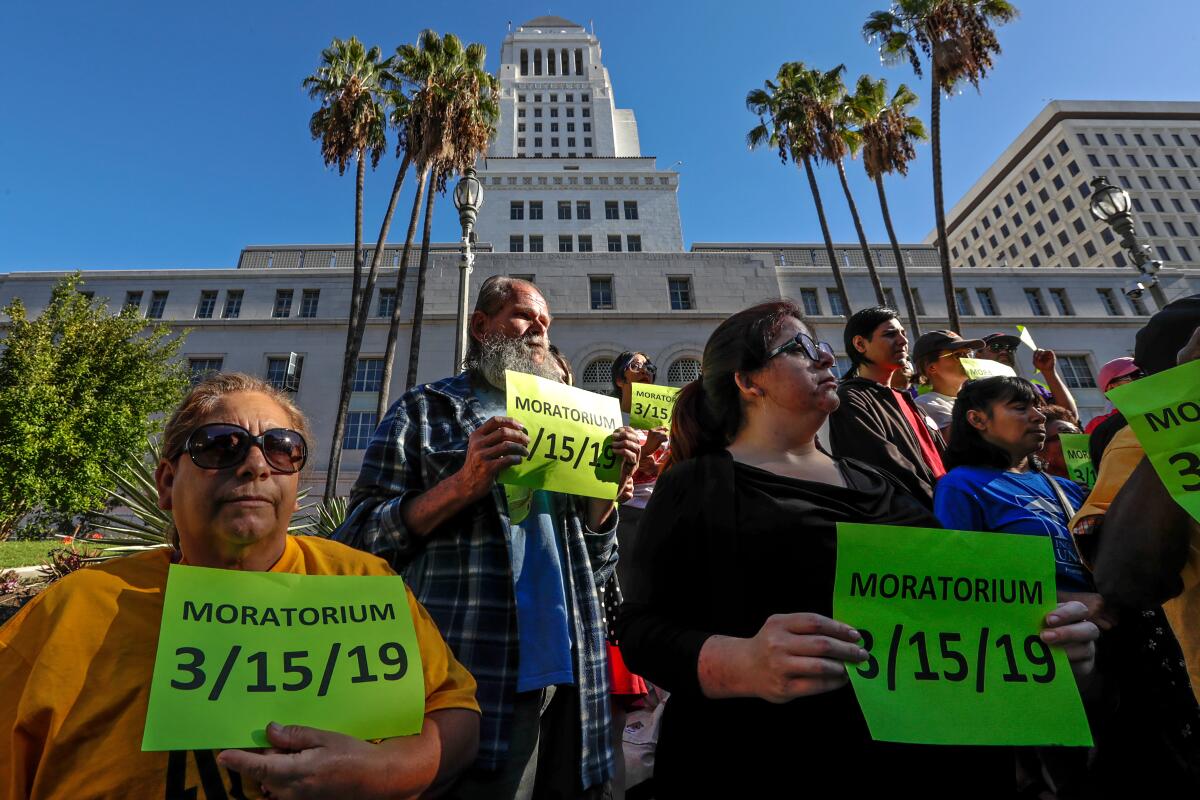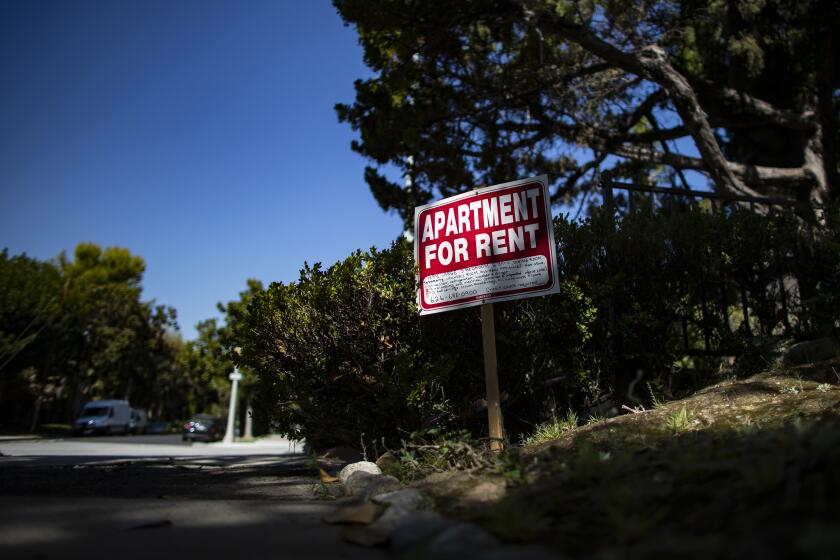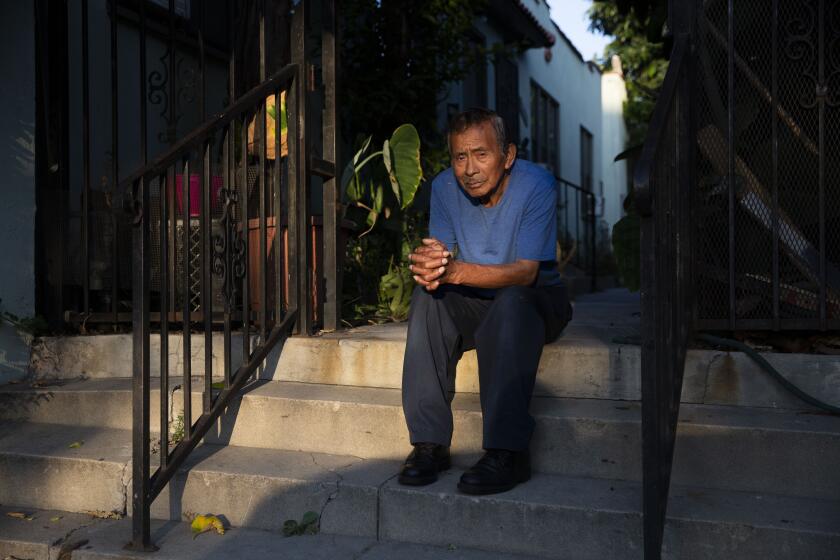New L.A. ordinance slaps moratorium on evictions ahead of Jan. 1

- Share via
The Los Angeles City Council approved an emergency moratorium on evictions Tuesday to stop landlords from quickly booting tenants before new statewide rental rules take effect in January.
In a 14-0 vote, council members passed a ban on “no-fault” evictions. The ban would prevent property owners from removing residential tenants unless there’s just cause, such as not paying rent or using a unit for criminal activity.
Mayor Eric Garcetti signed the ordinance late Tuesday afternoon and it’s expected to take effect this week.
The ordinance, proposed by Councilmen Mitch O’Farrell and Curren Price, is meant to stop what tenants groups have called a wave of no-fault evictions undertaken since Gov. Gavin Newsom signed Assembly Bill 1482 into law Oct. 8.
“Our city is experiencing a housing crisis, and we should be using every available tool to keep people in their homes, and runaway rents in check,” Garcetti said in a statement. “This ordinance is an important stopgap measure that will prevent evictions before the new state law takes effect.”
Under Los Angeles’ rent control ordinance, tenants who live in buildings built on or before Oct. 1, 1978, already have strong protections against no-fault evictions and rent increases.
But landlords of newer properties can generally tell long-term residents to leave in 60 days for no stated reason, as long as doing so wouldn’t break the lease. They can also raise the rent as high as they want on tenants when a lease ends.
That will change on Jan. 1 under the new state law, which leaves stricter city rent control ordinances in place and extends protections to many California tenants for the first time.
Annual rent increases for tenants in buildings older than 15 years will be capped at 5% plus inflation. Landlords covered by the law will also need just cause to remove renters who have lived in their units at least a year.
But while the law contains a provision that will cancel, as of Jan. 1, recent rent increases above the coming cap, the bill’s author said it wasn’t possible to roll back evictions that will have happened by the time the law takes effect.
Gov. Gavin Newsom has pledged to sign a statewide rent control bill for buildings older than 15 years. Studies from Los Angeles and San Francisco give insight into how landlords could respond.
As a result, as long as the notice to vacate expires before Jan. 1, property owners can still remove low-paying tenants and significantly raise rents for good, because state law gives landlords the right to set rent when a unit is vacant. A prominent landlord attorney has also been advising landlords to do so at local trade shows.
Council members were to originally vote on a moratorium, written by the city attorney, that would have canceled already issued no-fault evictions, as long as the tenant hadn’t moved and the notice to vacate hadn’t expired.
That probably would have canceled 60-day notices issued as far back as late August, before the Legislature approved AB 1482. But tenant groups wanted the moratorium retroactive to March, when the state bill was first unveiled to the public.
David Michaelson, chief assistant city attorney, told council members that having a law that would unravel an eviction that already took place “presents legal concerns.”
Council members eventually amended the motion to extend just-cause protections to tenants who are still in their units and who haven’t had an eviction lawsuit decided — a move that stands to cover more people than the original option.
The threat of displacement and loss of community takes a mental and physical toll on senior renters.
Larry Gross, executive director for the tenant’s rights group Coalition for Economic Survival, praised the change after the vote.
“The council and the city attorney did what needed to be done and we applaud their bold actions,” he said.
Daniel Yukelson, executive director of the Apartment Assn. of Greater Los Angeles, said the eviction moratorium will “cause a lot of confusion and hassle for property owners” who previously gave 60-day notices. But he doubted many landlords are actually handing out such notices to raise rents for good before the state law takes effect.
“I just object to the constant barrage making property owners out to be bad people,” he said, adding that just-cause restrictions simply make it more difficult to remove problem tenants.
The emergency city ordinance affects buildings built before 2005 and will expire when the new state rules take over.
Under those new rules, landlords will also need just cause for evictions, but can still tell tenants to leave for “substantial” renovations as long as they pay relocation assistance equal to one month’s rent.
Last week, in addition to asking the city attorney to draft the eviction moratorium, council members asked that an ordinance be written to limit rent increases for the rest of the year.
Some Bay Area activists are taking their wealth and are spending it on housing — for others. Rebelling against real estate speculation, they are building homes that will be kept affordable in perpetuity.
Even though the state law will ultimately cancel increases above the coming cap, landlords aren’t required to return money already paid, and tenant groups say a large rent increase could be tantamount to an eviction.
The rent-increase moratorium did not come before the council Tuesday, however, and any effort to cap rents on newer buildings is sure to face legal hurdles.
The Costa-Hawkins Rental Housing Act, for example, generally bars municipalities from limiting rent increases on buildings built after a given date, which in Los Angeles is Oct. 1, 1978.
The motion for a rent increase moratorium was authored by Councilwoman Nury Martinez. It also asked that the housing department report back with options for expanding eviction prevention efforts, including an emergency renters’ relief program.
Michaelson said the city attorney’s office and the housing department “are literally overturning every stone” to try to find a legal way to address the problem of landlords jacking rent up beyond the coming cap, including by using anti-price-gouging laws that are in effect during a state of emergency.
Martinez said she hopes her motion can come before the council “by the end of this week, if not early next week.”
More to Read
Inside the business of entertainment
The Wide Shot brings you news, analysis and insights on everything from streaming wars to production — and what it all means for the future.
You may occasionally receive promotional content from the Los Angeles Times.














